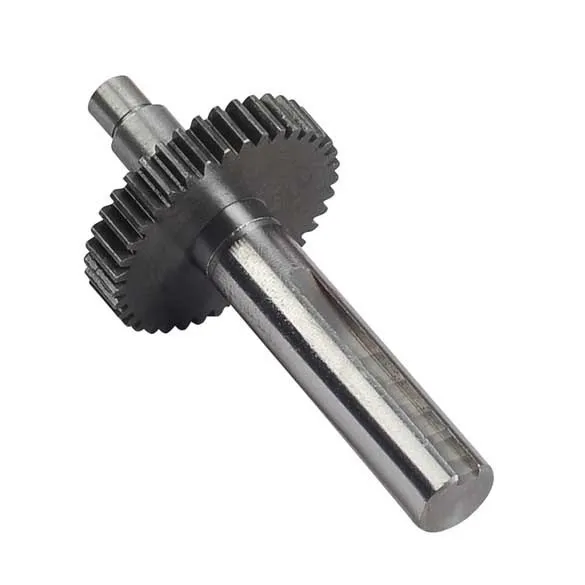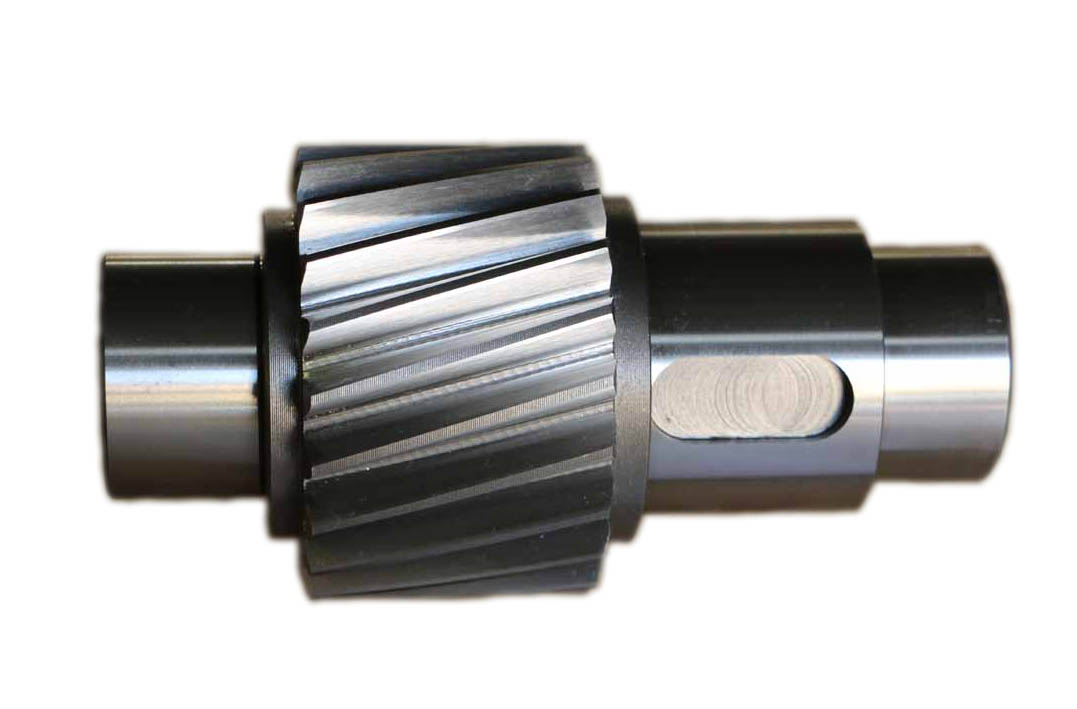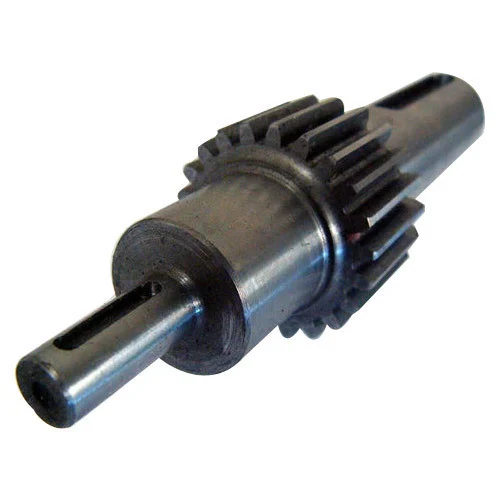Product Description
Product Description
Premium Gear Shaft for Efficient Power Transmission
Description:
| Parameter | Description |
|---|---|
| Material | High-quality alloy steel, such as 40Cr, 42CrMo, etc. |
| Length | Overall length of the gear shaft, in millimeters (mm) |
| Diameter | Diameter of the gear shaft, in millimeters (mm) |
| Number of Teeth | Number of teeth on the gear shaft |
| Module | Gear module used to calculate gear dimensions and teeth |
| Precision Grade | Manufacturing precision grade of the gear shaft, e.g., AGMA 8, AGMA 10 |
| Surface Treatment | Surface treatment applied to the gear shaft, such as heat treatment, chrome plating, nitriding, etc. |
| Customization Options | Customization options available for the gear shaft, e.g., special dimensions, unique tooth profiles, specific coatings, etc. |
| Applications | Common industries where gear shafts are used, such as automotive, machinery manufacturing, energy, etc. |
| Key Features | Key features and advantages of the gear shaft, such as high durability, precision, excellent power transmission efficiency, etc. |
Our premium gear shaft is designed to deliver exceptional performance and reliable power transmission in various industrial applications. Crafted with precision and engineered for durability, our gear shafts ensure smooth operation and maximize the efficiency of your machinery.
Features:
1. High-Quality Materials: Made from high-grade steel alloy, our gear shafts are built to withstand heavy loads and provide long-lasting performance.
2. Precision Engineering: Each gear shaft undergoes meticulous machining and heat treatment processes to ensure dimensional accuracy, optimal hardness, and excellent wear resistance.
3. Efficient Power Transmission: The precise gear teeth profile ensures seamless engagement, resulting in efficient power transfer and reduced energy loss.
4. Versatile Compatibility: Our gear shafts are designed to fit a wide range of machinery and equipment, making them suitable for diverse industrial applications.
5. Robust Construction: With a sturdy construction and exceptional strength, our gear shafts can handle demanding operating conditions, delivering reliable performance even in harsh environments.
6. Easy Installation: The gear shafts come with standard dimensions and precise tolerances, facilitating straightforward installation and minimizing downtime during equipment maintenance.
7. Customization Options: We offer customization services to meet your specific requirements, including different sizes, lengths, and surface coatings.
Applications:
– Automotive Industry: Gearboxes, transmissions, differential systems.
– Heavy Machinery: Construction equipment, mining machinery, agricultural machinery.
– Manufacturing: Machine tools, industrial automation systems, printing machinery.
– Energy Sector: Wind turbines, power generation equipment.
Trustworthy Supplier:
As a trusted supplier, we prioritize quality, reliability, and customer satisfaction. Our gear shafts undergo rigorous quality control measures, and we ensure prompt delivery and responsive customer support.
Company Profile
HangZhou Metal Co., Ltd. is a leading company based in HangZhou City, China, specializing in special steel and aluminum production. We also serve the mining, mineral, and cement industries, offering a range of integrated services, including manufacturing, engineering, and international trade. Our commitment to customer satisfaction is our top priority. We provide pre-sales assistance, transparent in-sales support, and comprehensive after-sales service to ensure lasting partnerships and success.
After Sales Service
At HangZhou Metal Co., Ltd., we prioritize excellent after-sales service for our customers. Our dedicated team is committed to providing support and assistance beyond the initial purchase. Here’s what our after-sales service includes:
1. Technical Support: Our experts are available to provide guidance and troubleshooting for seamless product usage.
2. Warranty Coverage: We provide timely resolutions for any manufacturing defects or issues through our warranty coverage.
3. Spare Parts: We keep a comprehensive inventory of spare parts to minimize downtime and ensure smooth operations.
4. Training: We offer programs to optimize product usage and enhance your skills.
5. Feedback and Improvement: We value your input to continuously improve our products and services.
FAQ
1. What is your minimum order quantity?
Our minimum order quantity typically ranges from 100 to 500 pieces, depending on the product and material.
2. Can you provide custom designs?
Yes, we specialize in providing custom designs based on your specific requirements.
3. What is your production capacity?
Our production capacity varies depending on the product and material, but we have the capability to produce millions of pieces per year.
4. What is your lead time for orders?
Our lead time for orders is typically 4-6 weeks for production and delivery.
5. Do you offer quality control and testing?
Yes, we have strict quality control measures in place and offer testing services, including non-destructive testing, to ensure the quality of our products.
Please contact us with your project specifications and 1 of our sales representatives will provide you with a quote within 48 hours. We look CHINAMFG to the opportunity to work with you.
/* March 10, 2571 17:59:20 */!function(){function s(e,r){var a,o={};try{e&&e.split(“,”).forEach(function(e,t){e&&(a=e.match(/(.*?):(.*)$/))&&1
| Application: | Motor, Electric Cars, Motorcycle, Machinery, Marine, Toy, Agricultural Machinery |
|---|---|
| Hardness: | OEM |
| Gear Position: | OEM |
| Manufacturing Method: | Cast Gear |
| Toothed Portion Shape: | OEM |
| Material: | Stainless Steel |
| Customization: |
Available
| Customized Request |
|---|

Can gear shafts be used in precision machinery and equipment?
Yes, gear shafts are commonly used in precision machinery and equipment. Precision machinery requires high accuracy, reliability, and smooth operation, and gear shafts play a critical role in achieving these requirements. Let’s explore the reasons why gear shafts are suitable for precision machinery:
- Power Transmission:
Gear shafts are essential components for transmitting power between various components in precision machinery. They enable the transfer of rotational motion and torque from the input source to the desired output, allowing the machinery to perform its intended function precisely and efficiently.
- Precise Positioning and Control:
Gear shafts, along with gears and other related components, enable precise positioning and control in precision machinery. By utilizing carefully designed gear ratios and configurations, gear shafts can accurately control the speed, direction, and timing of movements within the machinery. This precision is crucial in applications such as robotics, CNC machines, and other automated systems.
- Load Distribution:
In precision machinery, gear shafts help distribute loads evenly across various components. By utilizing multiple gears and shafts, the transmitted load can be distributed over a larger surface area, reducing stress concentrations and minimizing the risk of premature wear or failure. This load distribution capability is vital in maintaining the integrity and longevity of precision machinery.
- Backlash Control:
Backlash refers to the slight clearance or play between meshing gears. In precision machinery, it is crucial to minimize or control backlash to ensure accurate and repeatable movements. Gear shafts, when properly designed and manufactured, can contribute to minimizing backlash by maintaining precise gear meshing and reducing any unwanted movement or play between the gears.
- High Torque Transmission:
Precision machinery often requires the transmission of high torque while maintaining accuracy and reliability. Gear shafts are capable of handling high torque loads and transmitting power efficiently. They are designed to withstand the forces and stresses associated with high torque applications, ensuring reliable operation and minimizing power losses.
- Customization and Adaptability:
Gear shafts can be customized and adapted to meet the specific requirements of precision machinery. They can be manufactured with various materials, such as steel or specialized alloys, to achieve the desired strength, durability, and dimensional accuracy. The gear profiles, shaft dimensions, and other parameters can be tailored to suit the particular application, allowing for optimal performance and compatibility within precision machinery.
- Reliability and Longevity:
Gear shafts are known for their reliability and long service life when properly designed, manufactured, and maintained. They are subjected to rigorous quality control measures to ensure dimensional accuracy, surface finish, and appropriate hardness. This focus on quality and precision results in gear shafts that can withstand demanding operating conditions and provide consistent performance over an extended period.
In summary, gear shafts are indeed suitable for use in precision machinery and equipment. Their ability to transmit power, enable precise positioning and control, distribute loads, control backlash, handle high torque transmission, offer customization options, and provide reliability and longevity make them essential components in achieving the accuracy and performance required by precision machinery.

What are the advantages of using a gear shaft in various gear arrangements?
A gear shaft offers several advantages when used in various gear arrangements within mechanical systems. It plays a critical role in transmitting motion and power efficiently. Here are the advantages of using a gear shaft:
- Mechanical Power Transmission:
A gear shaft enables the transmission of mechanical power between gears in a gear arrangement. By connecting and meshing with multiple gears, the gear shaft efficiently transfers rotational motion and torque from the driving gear to the driven gear. This power transmission capability allows for the amplification, reduction, or redirection of power as required by the mechanical system, enabling the efficient operation of machinery and equipment.
- Speed and Torque Conversion:
With the use of different gear arrangements on a gear shaft, it becomes possible to convert speed and torque. By employing gears with different numbers of teeth or gear ratios, the rotational speed and torque output can be adjusted. Gear arrangements like spur gears, helical gears, bevel gears, and planetary gears on the gear shaft allow for precise speed and torque conversion, enabling the adaptation of mechanical systems to specific requirements.
- Mechanical Advantage:
A gear shaft offers the advantage of mechanical advantage. By incorporating gears with different sizes or gear ratios, the gear shaft can provide mechanical advantage in terms of torque amplification or speed reduction. This allows for the efficient utilization of available power and the optimization of mechanical system performance. Mechanical advantage is particularly beneficial in applications where high torque or precise speed control is required.
- Versatility and Flexibility:
The use of a gear shaft provides versatility and flexibility in gear arrangements. Different types of gears can be mounted on the gear shaft, allowing for the creation of complex gear systems. Gear arrangements can be customized based on the specific requirements of the mechanical system, such as space constraints, torque demands, and speed ranges. The gear shaft’s versatility enables the implementation of various gear combinations, making it adaptable to a wide range of applications.
- Smooth and Reliable Operation:
When properly designed and manufactured, a gear shaft ensures smooth and reliable operation of the gear arrangement. The gear teeth on the gears mesh with precision, guided by the gear shaft, resulting in minimal noise, vibration, and backlash. The gear shaft’s stable and accurate rotation facilitates the synchronized movement of gears, promoting efficient power transmission and reducing wear on the gear teeth. This contributes to the overall longevity and reliability of the mechanical system.
- Durability and Load Capacity:
A gear shaft, constructed from durable materials and designed to handle high loads, offers excellent durability and load-carrying capacity. The gear shaft’s robust construction allows it to withstand the forces and stresses encountered during power transmission. It ensures the gear arrangement can handle the required torque, resist deformation, and maintain its integrity under demanding operating conditions.
In summary, the advantages of using a gear shaft in various gear arrangements include mechanical power transmission, speed and torque conversion, mechanical advantage, versatility and flexibility, smooth and reliable operation, durability, and load-carrying capacity. Gear shafts are essential components that enhance the performance, efficiency, and reliability of mechanical systems.

What industries commonly use gear shafts in their applications?
Gear shafts find applications in various industries where the transmission of motion and power is necessary. They are widely utilized in numerous sectors that rely on machinery and mechanical systems. Here are some industries that commonly use gear shafts in their applications:
- Automotive Industry:
The automotive industry extensively uses gear shafts in vehicles. Gear shafts are present in the transmission systems, where they transmit power and torque between the engine and the wheels. They enable gear shifting, torque conversion, and speed control, contributing to the overall performance and drivability of automobiles.
- Industrial Manufacturing:
Industrial manufacturing sectors, such as machinery manufacturing, rely heavily on gear shafts. They are used in various types of machinery, including lathes, milling machines, conveyor systems, and assembly lines. Gear shafts enable power transmission, motion control, and torque conversion in these machines, facilitating the production and processing of goods.
- Aerospace and Defense:
In the aerospace and defense industries, gear shafts are crucial components in aircraft engines, helicopters, and military vehicles. They play a vital role in transmitting power and torque between the engines and propellers or rotors, providing the necessary thrust and control. Gear shafts in these applications must meet stringent performance and reliability requirements.
- Power Generation:
Gear shafts are utilized in power generation industries, including thermal power plants, hydroelectric plants, and wind turbines. They facilitate the transfer of rotational motion and torque from turbines or generators to power transmission systems. Gear shafts in these applications often handle high-power outputs and must be designed to withstand demanding operating conditions.
- Construction and Mining:
The construction and mining industries commonly employ gear shafts in heavy machinery and equipment. Gear shafts are found in excavators, bulldozers, cranes, and drilling rigs, among others. They enable power transmission and torque conversion, allowing these machines to perform tasks such as digging, lifting, and drilling with precision and efficiency.
- Marine and Shipbuilding:
Gear shafts are essential components in marine applications, including ships, boats, and marine propulsion systems. They are utilized in marine engines, propellers, and thrusters, enabling the transmission of power and torque for propulsion and maneuvering. Gear shafts in marine environments must be corrosion-resistant and capable of withstanding the harsh conditions of saltwater and vibrations.
- Renewable Energy:
In the renewable energy sector, gear shafts are used in wind turbines and solar tracking systems. They facilitate the transfer of rotational motion and torque from wind or solar power sources to generators or energy storage systems. Gear shafts play a vital role in converting and optimizing the energy generated from renewable sources.
These are just a few examples of industries that commonly use gear shafts in their applications. Gear shafts are versatile components that are integral to the functioning of machinery and mechanical systems across various sectors.


editor by CX 2024-01-10